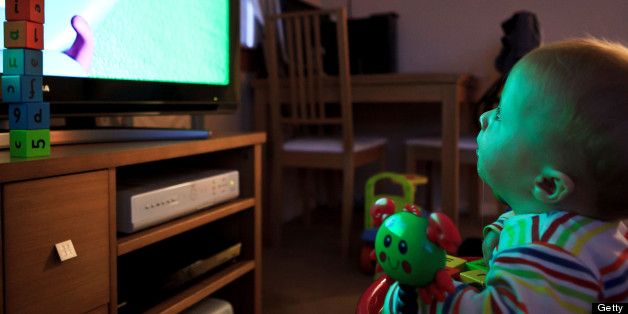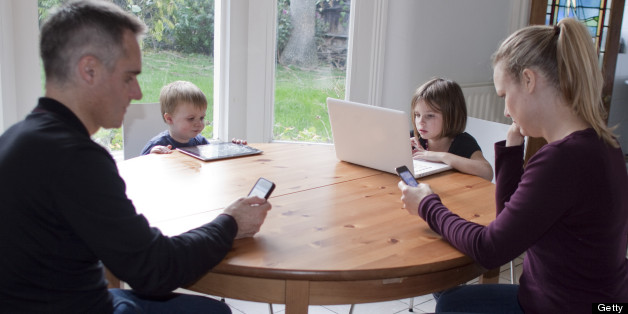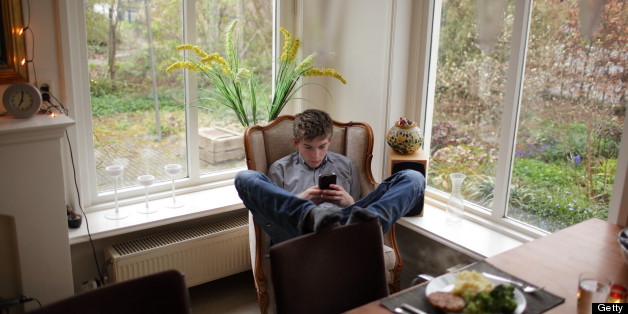Thursday, September 26, 2013
Construction Zone 5: Hard Hats - The Faithful 4 Take a Stand
This Sunday we
finally move beyond the Captivity into the book of Daniel as we focus on the
FAITHFUL FOUR who stood up for the God of
Wednesday, September 25, 2013
Team Color Theme Night!
Remind your kids to dress in clothes that match their color team for extra points tonight! But they won't win if they neglect the basics like wearing their uniform, bringing a Bible, handbook, offering, visitor, and showing up on time before 6:15pm!
8 Ways Screens Are Ruining Your Family's Life
For her new book, The Big Disconnect: Protecting Childhood and Family Relationships in the Digital Age, Catherine Steiner-Adair EdD -- a clinical instructor in the department of psychiatry at Harvard, a school consultant, and a therapist in private practice -- interviewed more than one thousand children between the ages of 4 and 18 to find out how technology was impacting their relationships and their social and emotional lives. What Steiner-Adair discovered was neither surprising, nor comforting: Technology is becoming a kind of “co-parent;” too much screen time is impeding childhood development; and parents’ obsession with their devices is harming communication with their children and even fracturing families.
Just in time for back to school, The Huffington Post asked Steiner-Adair to tell us the eight essential things parents with children of all ages need to know about screens.
1. Don’t put your baby in front of a screen. Ever.
 If you’re not convinced by the recommendation of the American Academy of Pediatrics, then consider this: “We don’t know yet the chemical interaction between a smartphone and a baby’s brain," says Steiner-Adair. One 2010 Danish study of 28,000 children found that exposure to cell phones before and after birth seemed to lead to an increased risk for behavioral problems. Beyond that, one of the most important skills a baby needs to learn, Steiner-Adair says, is how to calm herself down. “If you hand [a young child] a screen of any kind when they’re frustrated, you’re teaching them how not to self-soothe,” she says. “You’re handing them a stimulant. Your baby’s brain is brilliant and what it needs is good stimulation and soothing from you. You are the best app for your child.”
2. And think hard about putting your toddler in front of one, too.
If you’re not convinced by the recommendation of the American Academy of Pediatrics, then consider this: “We don’t know yet the chemical interaction between a smartphone and a baby’s brain," says Steiner-Adair. One 2010 Danish study of 28,000 children found that exposure to cell phones before and after birth seemed to lead to an increased risk for behavioral problems. Beyond that, one of the most important skills a baby needs to learn, Steiner-Adair says, is how to calm herself down. “If you hand [a young child] a screen of any kind when they’re frustrated, you’re teaching them how not to self-soothe,” she says. “You’re handing them a stimulant. Your baby’s brain is brilliant and what it needs is good stimulation and soothing from you. You are the best app for your child.”
2. And think hard about putting your toddler in front of one, too.
 “A child only has from 0-5 to develop neurologically what we call the sensorium -- that’s the part of the brain where pre-literacy, kinesthetic movement, and language development happens,” says Steiner-Adair. This kind of brain development takes place through outdoor play, building, dancing, skipping, coloring -- all activities involving multi-sensory engagement. This kind of healthy engagement is basically the opposite of passively swiping a finger across a screen, says Steiner-Adair. While she acknowledges that decent games and apps exist -- Steiner-Adair directs parents toCommon Sense Media’s website for recommendations -- she insists that replacing play “IRL” with play on a screen is not what children this age need.
3. Teachers can tell if your child is getting too much screen time.
“A child only has from 0-5 to develop neurologically what we call the sensorium -- that’s the part of the brain where pre-literacy, kinesthetic movement, and language development happens,” says Steiner-Adair. This kind of brain development takes place through outdoor play, building, dancing, skipping, coloring -- all activities involving multi-sensory engagement. This kind of healthy engagement is basically the opposite of passively swiping a finger across a screen, says Steiner-Adair. While she acknowledges that decent games and apps exist -- Steiner-Adair directs parents toCommon Sense Media’s website for recommendations -- she insists that replacing play “IRL” with play on a screen is not what children this age need.
3. Teachers can tell if your child is getting too much screen time.
 Educators interviewed for Steiner-Adair’s book said that kids who spend too much time in front of screens play differently -- and less creatively -- than other children. Those who act out “Mario Brothers” or “Angry Birds” in the school yard aren’t tapping into their capacity to create their own narratives, says Steiner-Adair. “Instead of saying ‘look how high I can go’ when they’re on the swings, they say ‘look, I got to the next level!’” she says. Teachers also told the author that students who play a lot of video games don’t seem to have as much patience to sit still in the classroom, especially when they are being read to. “The capacity for attention doesn’t develop as well when kids are used to interacting with a screen that’s instantly gratifying, instantly stimulating, and provides them what the answers for the next level,” says Steiner-Adair.
4. Your kids hate your screens.
Educators interviewed for Steiner-Adair’s book said that kids who spend too much time in front of screens play differently -- and less creatively -- than other children. Those who act out “Mario Brothers” or “Angry Birds” in the school yard aren’t tapping into their capacity to create their own narratives, says Steiner-Adair. “Instead of saying ‘look how high I can go’ when they’re on the swings, they say ‘look, I got to the next level!’” she says. Teachers also told the author that students who play a lot of video games don’t seem to have as much patience to sit still in the classroom, especially when they are being read to. “The capacity for attention doesn’t develop as well when kids are used to interacting with a screen that’s instantly gratifying, instantly stimulating, and provides them what the answers for the next level,” says Steiner-Adair.
4. Your kids hate your screens.
 Steiner-Adair says that what came up again and again during her interviews with hundreds of kids was how frustrated, sad and angry they were about having to compete with screens for their parents’ attention. “Children hate it when their parents pick them up and are on their phones and don’t even turn to say, ‘Hi honey, how was your day?’ Instead they’re giving them the shhh one minute signal which basically says ‘you’re not as important to me as whoever this other person on the phone is.’ Car rides to and from school as well as dinner, bath and reading time -- parents should be present and phone-free for all of these daily rituals, she says. “Kids do not need our undivided attention all day long, but they do in those real-life moments of talking and reading and doing the hard work of parenting -- dealing with meltdowns, teaching them how to pick up their clothes.” The bottom line: If you think your kids don’t notice that you’re distracted, you’re deluding yourself. One of Steiner-Adair’s subjects told her, “I miss the olden days when families were more important.”
5. Just because we can be connected to work 24/7 doesn’t mean we shouldbe.
Steiner-Adair says that what came up again and again during her interviews with hundreds of kids was how frustrated, sad and angry they were about having to compete with screens for their parents’ attention. “Children hate it when their parents pick them up and are on their phones and don’t even turn to say, ‘Hi honey, how was your day?’ Instead they’re giving them the shhh one minute signal which basically says ‘you’re not as important to me as whoever this other person on the phone is.’ Car rides to and from school as well as dinner, bath and reading time -- parents should be present and phone-free for all of these daily rituals, she says. “Kids do not need our undivided attention all day long, but they do in those real-life moments of talking and reading and doing the hard work of parenting -- dealing with meltdowns, teaching them how to pick up their clothes.” The bottom line: If you think your kids don’t notice that you’re distracted, you’re deluding yourself. One of Steiner-Adair’s subjects told her, “I miss the olden days when families were more important.”
5. Just because we can be connected to work 24/7 doesn’t mean we shouldbe.
 Many parents argue that part of why they’re plugged in during family time is because they feel they have to be available to their employers. “You either sacrifice being a good mother or father and the very limited time you have to raise your children -- or you sacrifice and risk your job to support your ability to live,” says Steiner-Adair. “This is not healthy for anybody and it’s a no-win choice.” Being constantly on call or being afraid of missing something if you don’t check your work email means you’re preoccupied and stressed when you should be enjoying your family. Steiner-Adair says that if the modern workplace is ever going to change, parents must ask employers for modulated schedules and speak up about their need to unplug.
6. Screens aren’t good for your marriage. And that’s not good for your kids.
Many parents argue that part of why they’re plugged in during family time is because they feel they have to be available to their employers. “You either sacrifice being a good mother or father and the very limited time you have to raise your children -- or you sacrifice and risk your job to support your ability to live,” says Steiner-Adair. “This is not healthy for anybody and it’s a no-win choice.” Being constantly on call or being afraid of missing something if you don’t check your work email means you’re preoccupied and stressed when you should be enjoying your family. Steiner-Adair says that if the modern workplace is ever going to change, parents must ask employers for modulated schedules and speak up about their need to unplug.
6. Screens aren’t good for your marriage. And that’s not good for your kids.
 Steiner-Adair asks parents to answer this question honestly: “First thing in the morning, do you roll over in bed and look at your phone and scroll through it -- or do you roll over and cuddle your partner?” Kids are acutely aware of their parents’ disengagement from each other. In her interviews with children, many spoke to Steiner-Adair about their parents’ constant bickering over screen rules (such as no phones at the table) and said that they view their parents as hypocrites when they see them flouting the family guidelines they’ve set up. “Kids see parents talking to each other about something important and then one of them answers a call mid-conversation,” she says. “One parent has dropped the other parent. What does it say to kids about how we connect to the people we love the most?”
7. In order to be a good parent, you need to take care of yourself.
Steiner-Adair asks parents to answer this question honestly: “First thing in the morning, do you roll over in bed and look at your phone and scroll through it -- or do you roll over and cuddle your partner?” Kids are acutely aware of their parents’ disengagement from each other. In her interviews with children, many spoke to Steiner-Adair about their parents’ constant bickering over screen rules (such as no phones at the table) and said that they view their parents as hypocrites when they see them flouting the family guidelines they’ve set up. “Kids see parents talking to each other about something important and then one of them answers a call mid-conversation,” she says. “One parent has dropped the other parent. What does it say to kids about how we connect to the people we love the most?”
7. In order to be a good parent, you need to take care of yourself.
 “Adults use screens the same way kids do -- to avoid interaction and to avoid relying on our own inner resources," says Steiner-Adair. Increasingly when parents have a few minutes to recharge they are using that time to browse Facebook, send texts, etc. “It’s so much easier than picking up a magazine or putting your feet up on the couch and having a mini moment of relaxation -- or going for a walk and getting some fresh air-- all these things that we know actually make us feel better.” Some parents may feel that browsing Instagram or scanning the news is actually a calming way to take a break, but Steiner-Adair is skeptical. “Checking your email is not relaxing,” she says. ”Holding a tiny little hand held screen is not visually relaxing.”
8. Sorry, but you really don’t know what your kids are doing online. But that doesn’t mean you should give up trying.
“Adults use screens the same way kids do -- to avoid interaction and to avoid relying on our own inner resources," says Steiner-Adair. Increasingly when parents have a few minutes to recharge they are using that time to browse Facebook, send texts, etc. “It’s so much easier than picking up a magazine or putting your feet up on the couch and having a mini moment of relaxation -- or going for a walk and getting some fresh air-- all these things that we know actually make us feel better.” Some parents may feel that browsing Instagram or scanning the news is actually a calming way to take a break, but Steiner-Adair is skeptical. “Checking your email is not relaxing,” she says. ”Holding a tiny little hand held screen is not visually relaxing.”
8. Sorry, but you really don’t know what your kids are doing online. But that doesn’t mean you should give up trying.
 Steiner-Adair points to a June 2013 McAfee study, “Digital Deception: Exploring the Online Disconnect Between Parents and Kids,” as evidence that parents are often clueless about what their kids are doing online -- and says that their ignorance is seriously harming their kids. Among the study’s findings: 80 percent of parents don’t know how to check up on what their kids are doing online. Not only that, 74 percent “simply admit defeat and claim that they do not have the time or energy to keep up with their children and hope for the best,” according to the study’s authors. But Steiner-Adair says defeat is not an option when you consider all of the damaging content kids can easily stumble upon online. While interviewing kids for her book, Steiner-Adair says, several teen boys asked her questions about sexual scenes they’d seen online. “They would say, ‘can you help me understand why a woman would want to be choked while having sex? Why would she want to be peed on?’” Indeed, the McAfee study found that over 57 percent of 13-23 year olds use the Internet to search sexual topics while only 13 percent of parents believe they do.
But Steiner-Adair sees hope in at least one of the McAfee stats: Nearly half of the teens surveyed said they would change their online behavior if they knew their parents were watching. “This means we can have an impact,” Steiner-Adair says. In addition to making sure that all computer use is done in a public place in the home, Steiner-Adair recommends that parents and kids sign an agreement that clearly states acceptable and unacceptable online behavior – and post it prominently. “The reason you’re supposed to sign it and post it is to remind kids, but also so that when other kids come over it makes it easier for your child to say, ‘oh no, I’ll get in too much trouble if I go to that site. See, I have the worst parents in the word," Steiner-Adair says. “That’s what you want your kids to say. You want to be that worst parent in the world.”
By Lori Leibovich
Steiner-Adair points to a June 2013 McAfee study, “Digital Deception: Exploring the Online Disconnect Between Parents and Kids,” as evidence that parents are often clueless about what their kids are doing online -- and says that their ignorance is seriously harming their kids. Among the study’s findings: 80 percent of parents don’t know how to check up on what their kids are doing online. Not only that, 74 percent “simply admit defeat and claim that they do not have the time or energy to keep up with their children and hope for the best,” according to the study’s authors. But Steiner-Adair says defeat is not an option when you consider all of the damaging content kids can easily stumble upon online. While interviewing kids for her book, Steiner-Adair says, several teen boys asked her questions about sexual scenes they’d seen online. “They would say, ‘can you help me understand why a woman would want to be choked while having sex? Why would she want to be peed on?’” Indeed, the McAfee study found that over 57 percent of 13-23 year olds use the Internet to search sexual topics while only 13 percent of parents believe they do.
But Steiner-Adair sees hope in at least one of the McAfee stats: Nearly half of the teens surveyed said they would change their online behavior if they knew their parents were watching. “This means we can have an impact,” Steiner-Adair says. In addition to making sure that all computer use is done in a public place in the home, Steiner-Adair recommends that parents and kids sign an agreement that clearly states acceptable and unacceptable online behavior – and post it prominently. “The reason you’re supposed to sign it and post it is to remind kids, but also so that when other kids come over it makes it easier for your child to say, ‘oh no, I’ll get in too much trouble if I go to that site. See, I have the worst parents in the word," Steiner-Adair says. “That’s what you want your kids to say. You want to be that worst parent in the world.”
By Lori Leibovich








Saturday, September 14, 2013
Construction zone lesson 3!
Building Codes: Warnings
of Danger!
I will faithfully
follow God’s building code, the Bible.
This Sunday at 10:30am!
Tomorrow in the C.H.R.I.S.T. WORKS
Playhouse our Construction Theme continues but with a bit of heroic twist as we
focus on some key prophets who warned the people of Israel
and Judah
about the coming judgment. They were
like super heroes of their time trying to rescue a foolish people bent on sin.
Teaching Through Decision Making
Families make decisions and solve problems on a daily
basis. Parents must make some decisions, and in those cases children need to
learn to follow. At other times parents can involve children and help them make
wise choices.
Money, for example, provides opportunities for children to make decisions. Parents can teach children how to save, be generous, and plan for purchases. In one family, Kari, age twelve, and Joel, age thirteen, were each given ten dollars for babysitting. Kari saved her money but Joel spent his right away. A few days later when the family was at a museum, Kari and Joel both wanted to buy something at the gift shop. Kari had money but Joel said, "I wish I would have saved my money so I could buy something here."
It's better for children to learn their lessons with small amounts of money early, than to wait and make a costly mistake later on. Joel's parents honored him by allowing him to make mistakes. They didn't say, "I told you so." They simply allowed him to learn from his own experience, but they didn't rescue him either.
Developing good decision-making skills gives kids the ability to define a problem, look at consequences of various alternatives, and then choose the best solution among the options. Having open discussions about decisions and then allowing children to solve some problems for themselves communicates honor to them. It says, "I believe in you. You have what it takes."
Money, for example, provides opportunities for children to make decisions. Parents can teach children how to save, be generous, and plan for purchases. In one family, Kari, age twelve, and Joel, age thirteen, were each given ten dollars for babysitting. Kari saved her money but Joel spent his right away. A few days later when the family was at a museum, Kari and Joel both wanted to buy something at the gift shop. Kari had money but Joel said, "I wish I would have saved my money so I could buy something here."
It's better for children to learn their lessons with small amounts of money early, than to wait and make a costly mistake later on. Joel's parents honored him by allowing him to make mistakes. They didn't say, "I told you so." They simply allowed him to learn from his own experience, but they didn't rescue him either.
Developing good decision-making skills gives kids the ability to define a problem, look at consequences of various alternatives, and then choose the best solution among the options. Having open discussions about decisions and then allowing children to solve some problems for themselves communicates honor to them. It says, "I believe in you. You have what it takes."
For more practical ideas on developing honor in your family consider the book, Say Goodbye to Whining, Complaining, and Bad Attitudes, In You and Your Kids by Dr Scott Turansky and Joanne Miller, RN, BSN.
Tuesday, September 3, 2013
Awana Clubs Launch Tomorrow Night at 6:15pm!
6:15pm
Notice, that’s
NOT 6:30 but 6:15pm!!
Kids clubs
start 15 minutes before the adult prayer service & everything else so don’t
make your kids late! They get team
points for being on time! Every night
when kids check in they get points for:
Bringing their
Bible,
Bringing their
achievement book,
Wearing their
uniform,
Just showing
up,
AND for being
on time!
Also points
for every section they memorize in a week,
And
VISITORS!
So start the
year right and be here on time for the first night!
Doors open at
6pm!
SPECIAL
NOTE: We turn NO ONE away
for lack of $$ for Awana!
If you are struggling
let us know when you register your kids and we will work something out to help
you! We may ask you to cover what you can over a longer period of time or cover
part of the amount to help cover the cost of supplies (we just put in an order
for $800.00+), but we do not want anyone to miss
out!
Not
Anyone!
Be a Coach to Your Children
I'm sure that as you look around you see other families who have rather interesting relationships with their kids. Some parents seem to have a boss/servant relationship with their children, as if the parents own their kids. They order them around as if they were slaves, being demanding about obedience and respect. Others act like a policeman allowing children to do anything they want within boundaries. When the children move outside the boundaries then the parent blows the whistle to get them back in line. Other parents have a little prince relationship with their children. These parents go out of their way to make their children happy, sometimes trying to make up for their own unhappiness as a child.
A better analogy is the one that views the parent as a coach. Your children need training every day, involving teaching, correcting, firmness, and encouragement. A coach builds a relationship with the child, recognizes weaknesses and equips the child to succeed. When a runner falls down, a good coach doesn't condemn but motivates to excellence through support and encouragement. The coach and the athlete are both on the same side, working to make that young person successful.
Don't let childish problems like anger, impulsiveness, or meanness motivate you to become an opponent to your children, allowing the problem to come between you. Instead, partner with your children, moving the problem to the side, with you and your child working together to conquer it. Your attitude in conflict will mean all the difference for a child who needs to be coached out of immaturity. Children need to know that their parents believe in them. It helps them in the deepest areas of their hearts.
This parenting tip comes from
the book Home Improvement, the
Parenting Book You Can Read to Your Kids by Dr Scott Turansky and Joanne
Miller, RN, BSN.
Subscribe to:
Posts (Atom)




